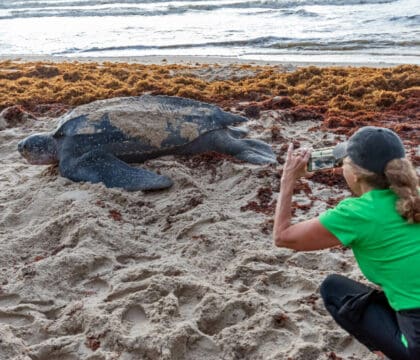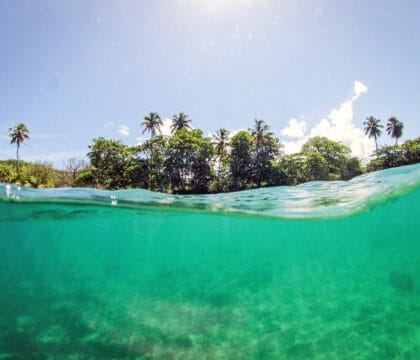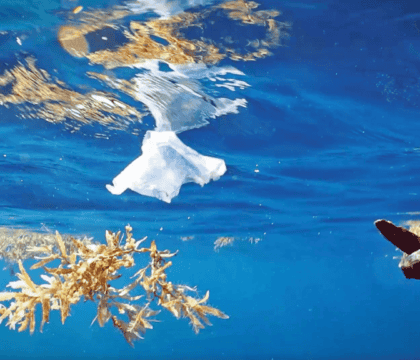January 5, 2017 • Trip Reports
In November 2016 I led a weeklong Oceanic Society snorkeling expedition to the Bay Islands of Honduras. Once again, we had an amazing experience exploring gorgeous reefs while learning about how to better protect our oceans.
We had a great group of people who not only improved their snorkeling skills—because we snorkeled EVERY DAY—but who also learned about the recovery of endangered corals. The “house reef,” (accessed via a short swim across a vibrant and healthy sea grass bed), and the surrounding reefs are peppered with a variety of colorful species of reef fish and stands of Elkhorn and Staghorn coral that are re-growing in areas where they may have been affected by a combination of storms, disease, and warming waters. Both of these species of coral are protected under the U.S. Endangered Species Act, so it was a thrill to see them.
In addition to all the amazing fish and corals we saw, the highlight was the reef squid that we saw several times. Twenty-two of them stayed near us for almost half an hour putting on a fantastic display of synchronized, flashing colors and patterns.
During the week, one of the evening seminars I gave was on the topic of “Ocean Plastics: Problems and Solutions.” We talked about the magnitude of the plastic pollution problem—how every piece of plastic created since it was invented still exists today, and how so much of it ends up in our oceans, impacting wildlife. The very next day, we were snorkeling around a small island and found it covered in plastic trash. As a team, the whole group decided we should clean it up. We picked-up all the plastic and Styrofoam, filling three large garbage bags, and with a storm chasing us we snorkeled and kayaked it all back to the dive boat for disposal in town. And as if the ocean were rewarding us for our efforts, on the boat trip back we were escorted by dozens of leaping Atlantic bottlenose dolphins!
Guests were so inspired, they asked for and got copies of the PowerPoint presentation from the night before so that they could return home and effect change in their own communities. Some simple changes are to refuse single-use plastics, to re-use/repurpose plastics you buy, and to recycle (go here for more ways to reduce ocean plastic pollution).
Our shore-based activities were beautiful and conservation-oriented too. We visited an iguana sanctuary where they are protected from local hunting. And at Carambola Botanical Gardens we learned about the wonderful fruit trees of the region including the fascinating history of cacao cultivation. The garden also housed a few of the remaining palm trees that were spared from disease that wiped out palms across the island. They serve as a genetic bank for future restoration.
Roatan is a treasure with so much more to explore. We’ll return next year and hope you will join us! Click here for trip information.




